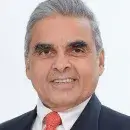
Kishore Mahbubani
Kishore Mahbubani has
had distinguished careers in two different fields. Firstly, in the area of
diplomacy, he served in the Singapore Foreign Service for 33 years, notably as
Singapore’s Ambassador to the UN and twice as President of the UN Security
Council in January 2001 and May 2002. He has had postings in Cambodia (where he
served during the war in 1973-74), Malaysia, Washington DC and New York. He was
Permanent Secretary at the Singapore Foreign Ministry from 1993 to 1998. Secondly,
in the area of academia, he also served as the Founding Dean of the Lee Kuan
Yew School of Public Policy from 2004 to 2017. He was also the Founding Director and the first Dean of the Civil Service College in Singapore from 1992 to 1994.
Prof Mahbubani has spoken and published globally. He has authored seven books: Can Asians Think?, Beyond the Age of Innocence, The New Asian Hemisphere, The Great Convergence (selected by Financial Times as one of the best books of 2013), Can Singapore Survive? and The ASEAN Miracle (co-authored with Jeffery Sng). His latest book, Has the West Lost it?, was published in April 2018. He was also Chairman of the Nominating Committee of the Lee Kuan Yew World City Prize from 2008 to 2018.
He graduated with a First Class Honours degree in Philosophy from the University of Singapore under a President’s Scholarship. From Dalhousie University, Canada, he received a Master’s degree in Philosophy and an honorary doctorate. He held visiting appointments at Columbia University, Harvard University and Fudan University in 2018. He was a fellow at the Harvard University Center for International Affairs from 1991-1992. He was selected as one of Prospect magazine’s top 50 world thinkers in 2014 and as one of Foreign Policy’s Top Global Thinkers in 2010 and 2011. In March 2009, he was listed by the Financial Times among the Top 50 individuals who would shape the debate on the future of capitalism, and in 2011 was described by Foreign Policy as “the muse of the Asian century”.